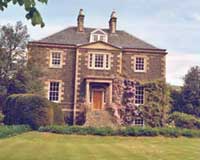The Legacy
 Many Scottish merchants and doctors invested and worked in the slave trade and sugar plantations. Once they had made their fortune, they returned home to buy a country estate. Thus the legacy of the slave trade in Scotland is still with us - in buildings and street names. Eg Jamaica Street
Many Scottish merchants and doctors invested and worked in the slave trade and sugar plantations. Once they had made their fortune, they returned home to buy a country estate. Thus the legacy of the slave trade in Scotland is still with us - in buildings and street names. Eg Jamaica Street
Others sunk their money into public works John Newlands of Bathgate – Bathgate academy and Archibald Kerr – left his plantation and slaves to the city infirmary.
The places names and surnames from Britain that are established in the former colonies.
The pattern of immigration into Britain in 20th cent was determined by extent of our empire in the 19th.
The campaign to abolish slavery reflected a change of attitude to what was an acceptable way to treat other human beings. It paved the way for the reforms of the 19th cent (factory acts, electoral reform, education, health measures etc).
Slavery transformed the economies of the countries that took part in it. It took place in the period of agrarian and industrial revolutions, was part of it (cotton).
In general it was devastating for affected African ‘nations’. Some individuals became very rich, but the wealth of the area decreased because the population had been decimated. Many consider its effect is still felt in Africa today.
The black and white poor of this period were friends, not rivals. So much so, in fact, that Sir John Fielding, a magistrate and brother of the novelist Henry Fielding, complained that when black domestic servants ran away and, as they often did, found '... the Mob on their side, it makes it not only difficult but dangerous to the Proprietor of these Slaves to recover the Possession of them, when once they are sported away'.
Not for nothing did a coin - the guinea - derive its etymology from the West African region of that name, the area from which hundreds of thousands of indigenous people were seized against their will. For traders of 17th and 18th century Britain, the African was literally a unit of currency.
Once slave trade abolished Britain became poacher turned gamekeeper and roamed the high seas ‘encouraging’ others to stop trading by capturing the ships and freeing the slaves (by depositing them on nearest free coast)
Tobacco and sugar did/do nothing to improve the nation’s health, they would have come eventually anyway, but it was a result of the slave trade that they came in large quantities when they did.


